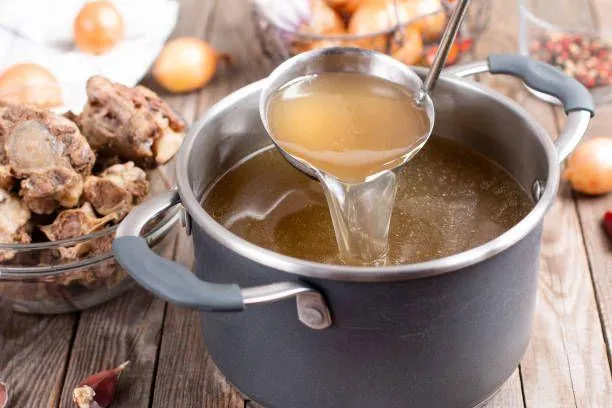
Bone broth- why not all experts agree
Bone broth... a surprising "bone of contention" in the nutrition world! (forgive the pun)
There are questions, and not all experts agree regarding the answers to bone broth.
The questions: Is it really that nutritious? Are there any risks for toxicity? And should you or should you not add apple cider vinegar?
Basically the factors that make the most difference to the nutrition outcome (or toxicity) not surprisingly seem to relate to quality of the ingredients (bones) and the processing, e.g. the degree of processing, in this case cooking (time and heat) or adding vinegar (water ratio, other ingredients). Reducing the pH (adding vinegar) increased calcium and magnesium extraction, as did longer cooking time. However, even at upper levels this could only achieve 5% of recommended daily levels of calcium and magnesium. And similarly levels of lead, cadmium and aluminium were low (and minimal at microgram levels) and therefore not considered to warrant much concern. Probably worth mentioning, is while the research considered levels of extraction, it didn't consider how bioavailable these minerals/metals were. And the quality or health of an individuals gut biome will assist absorption of beneficial ingredients and resist absorption of toxic metals to varying degrees, so this is a consideration.
Other research discussed amino acid concentration and availability of bone broth, and this seems to differ between types of bone broth, with some outperforming others, making it an inconsistent source of key amino acids. In terms of benefits: Bone broth has been found to have anti-inflammatory properties (and its consumption could decrease the symptoms of ulcerative colitis). And there is some evidence that the addition of bone broth into the diet after weaning may have a neuro-protective effect, and specifically may reduce risk of migraines (in prone or stressed individuals). I have heard stories of people substituting bone broth instead of formula for weaning babies... and I would be really cautious about doing that, and can't say I would be an advocate. Bone broth is nutritious but not a stand alone food, it is great as part of a balanced diet and certainly nutrient dense but not meant to be a substitute for whole foods. It's important you meet yourself at your point of need (or who you are caring for at their point of need)... which is dependent on a number of factors. (For specific weaning tips, you can refer to my Infant weaning guidelines.)
So while there are some clear benefits to bone broth, it's neither a cure all as some might suggest, or as risky as others suggest. Additionally like anything quality and quantity matters, it seems the best approach is to source well made bone broths, or to follow a good recipe, and only use quality bones (preferably organic), with the right amount of water to bones ratio, (add vinegar or don't based on the particular nutrition you are hoping to get out of the broth, noting acidity effect,) and be clear on what you are trying to get out of the bone broth (specific nutrients e.g. amino acids, gelatin, collagen, calcium, magnesium, or other specific effects) to see if it can actually help you.

Ancient nutrition wisdom continues to advocate from "eating the whole animal" because of the different nutrients you can get from different parts of the animal or different cuts of meat. They all tend to have different prominent amino acids and different ratios of other nutrients and minerals. Don't limit yourself to just certain cuts of meat like rump steak or chicken breast. Rather, buy a whole organic chicken, enjoy the skin, the breasts, the thighs, the legs and then make bone broth out of the carcus and enjoy that.
If you enjoy beef, eat a mix of organic beef organ meats like liver, enjoy steak from the tender parts, and make ground beef with some of the other parts and stews with the rest, and make bone broth out of the bones. A popular trend now is to "share a happy cow" between a few friends who are connected with organic farmers.
The scope of this article hasn't really explored the uses of both broth. This article just considers it in the context of a healthy balanced diet. There is increasing popularity adding this to the diet of people who are recovering with cancer, to maximise their nutrition status, bone broth can definitely be beneficial when used properly.
Generally though, if you have questions regarding what's best for you, consult with a fully degree qualified nutritionist or a dietitian.
Source article links below:
https://foodandnutritionresearch.net/index.php/fnr/article/view/1245
https://pubmed.ncbi.nlm.nih.gov/34833355/
https://pubmed.ncbi.nlm.nih.gov/29893587/
https://pubmed.ncbi.nlm.nih.gov/32326809/
Image source:

